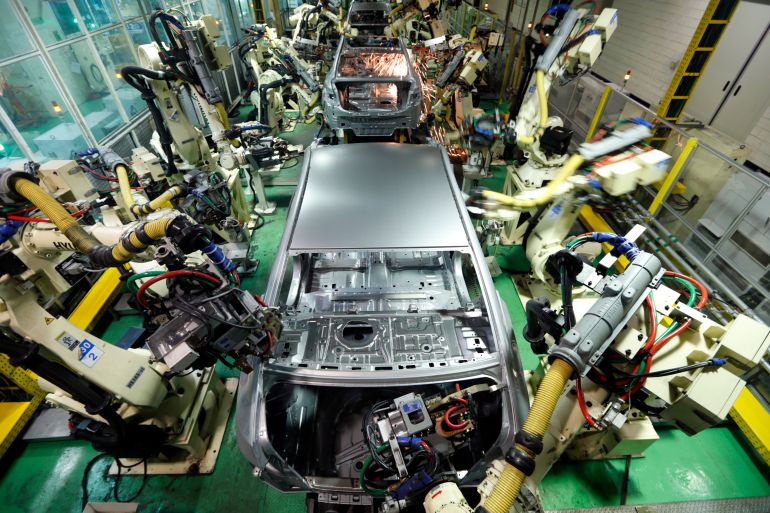South Korea’s factory output falls in warning for global economy
Asia’s fourth-largest economy sees industrial output shrink a worse-than-expected 1.8 percent in August.

South Korea’s factory production fell for a second straight month in August, a warning sign for the global economy as it faces risks from the war in Ukraine to rising interest rates.
Asia’s fourth-largest economy saw industrial output shrink a worse-than-expected 1.8 percent on a seasonally-adjusted monthly basis after falling 1.3 percent in July, government figures showed on Friday.
Keep reading
list of 4 itemsFacebook’s Meta to freeze hiring, further restructure: Report
US Senate approves $12bn for Ukraine in government funding bill
Zimbabwe court fines novelist Tsitsi Dangarembga over protest
Compared with the same month a year earlier, factory output rose 1.0 percent, the slowest pace since September 2021.
However, output for the services sector rose 1.5 percent on the month, while retail sales jumped 4.3 percent, the fastest gain since May 2020.
The figures follow a raft of data showing slowing factory output in other major Asian economies, including China, Japan and Taiwan.
China’s factory activity slowed further in September following a decline the previous month, as Beijing’s ultra-strict “zero COVID” policies hit production and sales, according to a private sector survey released on Friday.
South Korea, one of the world’s biggest manufacturers of cars, chips and ships, is seen as a barometer of the health of global trade as its companies span a vast swathe of the world economy.
South Korea’s exports, which account for nearly 40 percent of gross domestic product (GDP), are expected to slow sharply in September, with a survey of economists by the Reuters news agency predicting the slowest growth in nearly two years ahead of the release of official figures next month.
“This is certainly concerning for the domestic and global economy,” Min Joo Kang, senior economist for South Korea and Japan at ING, told Al Jazeera.
“The weaker than expected industrial production was driven by Korea’s main export items such as semiconductors and petrochemicals. This would have a negative impact on GDP for Korea for sure and also suggests global demand weakness. Usually it takes 4-5 quarters for semiconductors to come out of their downward cycle, thus the bottom hasn’t come yet.”